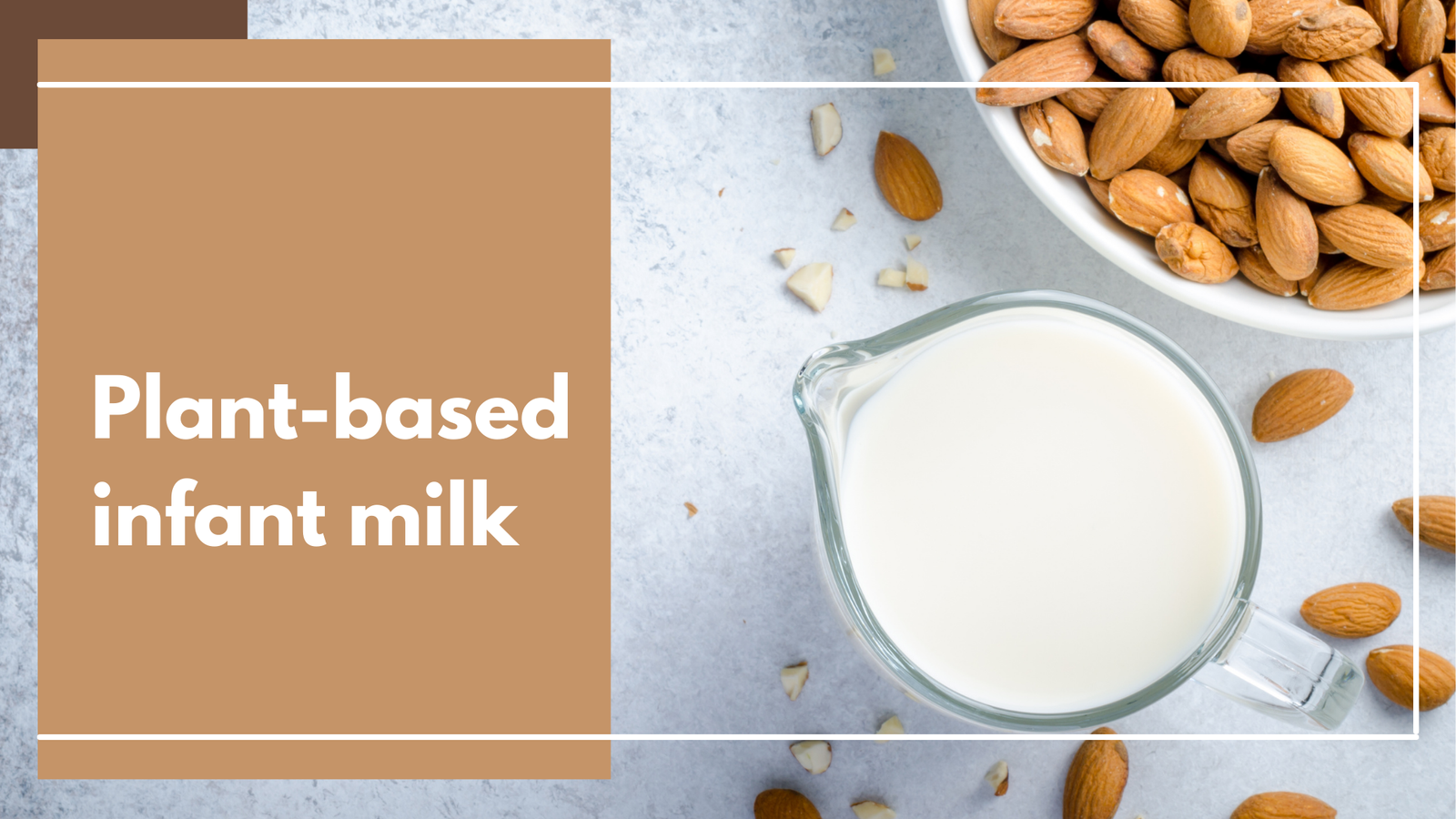The Pros and Cons of Dairy Milk Formula and Plant-Based Milk Formula for Infants
January 14, 2024 | by Connie Africano Remoroza

Feeding infants is a crucial aspect of their development, and choosing the right milk formula can be a daunting task for many parents. With a wide range of options available, it’s important to understand the pros and cons of different types of formula, including dairy milk formula and plant-based milk formula.
Dairy Milk Formula
Dairy milk formula, typically made from cow’s milk, has been a popular choice for feeding infants for decades. It is widely available and provides essential nutrients necessary for a baby’s growth and development. Here are some key pros and cons to consider:
Pros
- Nutrient-rich: Dairy milk formula contains a balanced mix of proteins, fats, carbohydrates, vitamins, and minerals, which are essential for a baby’s overall health.
- Familiar taste: The taste of dairy milk formula is similar to breast milk, making it easier for babies to transition from breastfeeding.
- Widely available: Dairy milk formula is readily accessible in most stores, making it convenient for parents to purchase.
Cons
- Allergenic potential: Some infants may have allergies or sensitivities to cow’s milk proteins, leading to digestive discomfort, skin rashes, or other allergic reactions.
- Digestive issues: Dairy milk formula can be harder for some infants to digest compared to breast milk, potentially leading to issues like gas, constipation, or colic.
- Environmental concerns: The production of dairy milk formula can have a significant environmental impact, including greenhouse gas emissions and water usage.
Facts about Organic based-Goat Milk (Formuland)
Goat’s milk boasts remarkable properties that make it easily tolerated and an excellent foundation for baby food. Unlike cow’s milk, which undergoes a merocrine secretion process in the udder, goat’s milk is formed through an apocrine secretion, similar to human breast milk. This natural similarity to breast milk makes goat’s milk an ideal choice for infant nutrition.
One key advantage of goat’s milk is its higher concentration of short and medium-chained fatty acids, which are more easily absorbed and digested by the body compared to long-chain fatty acids. Additionally, the fat globules in goat’s milk are smaller than those in cow’s milk, resulting in a larger total surface area. This structural difference enables enzymes to break down the fat more efficiently, further enhancing digestibility.
Plant-Based Milk Formula
Plant-based milk formulas, such as soy or almond milk formula, have gained popularity in recent years due to various reasons, including dietary restrictions and ethical considerations. Let’s explore the pros and cons:
Pros
- Alternative for allergies: Plant-based milk formulas provide an alternative for infants with cow’s milk protein allergies or lactose intolerance.
- Environmental benefits: Plant-based formulas have a lower carbon footprint compared to dairy milk formulas, making them a more sustainable choice for environmentally conscious parents.
- Vegetarian or vegan lifestyle: Plant-based formulas are suitable for families following a vegetarian or vegan lifestyle, ensuring their dietary preferences are met.
Cons
- Potential nutrient deficiencies: Plant-based milk formulas may lack certain essential nutrients found in dairy milk, such as calcium, vitamin D, and vitamin B12. It’s important to ensure these nutrients are supplemented adequately.
- Flavor and taste: Plant-based formulas may have a different taste compared to dairy milk, which can sometimes be less appealing to infants.
- Availability: Plant-based formulas might not be as widely available as dairy milk formulas, making it more challenging for parents to find them in local stores.
Top Brands Infant Formula Milk
When it comes to allergens, both dairy milk formula and plant-based milk formula have their considerations. Dairy milk formula contains cow’s milk proteins, which can be allergenic for some infants. On the other hand, plant-based formulas often use soy or almond as alternatives, which can also cause allergic reactions in certain individuals.
When choosing formula milk, it’s essential to carefully read the ingredients list and consult with a pediatrician if your child has known allergies or sensitivities. Top brands of formula milk for infants and toddlers include:
Similac (Abbott):
Offers a range of formulas catering to different needs, including Similac Advance and Similac Pro-Advance.
Known for incorporating ingredients that support brain and eye development.
Enfamil (Mead Johnson Nutrition):
Provides various formulas such as Enfamil NeuroPro and Enfamil Gentlease.
Emphasizes the inclusion of DHA (docosahexaenoic acid) for brain development.
Holle (Holle Baby Food GmbH):
A European brand known for its organic baby formulas.
Follows strict organic farming practices.
Kabrita Goat Milk Formula:
An alternative for babies with cow’s milk sensitivity, as it’s made from goat milk.
Known for its easy digestion.
Nannycare (Nannycare Ltd):
A goat milk-based formula that may be suitable for babies with cow’s milk protein sensitivity.
Known for its goat milk’s nutritional benefits.
A2 Platinum Infant Formula (The a2 Milk Company):
Contains A2 beta-casein protein, which is believed to be easier to digest than A1 beta-casein found in some cow’s milk.
Emphasizes a more natural form of milk.
Nutramigen (Enfamil):
Specifically designed for babies with cow’s milk protein allergy.
Known for its hypoallergenic properties.
Recommended Plant-based Formula Milk
Bebe M Organic Rice formula (Formuland)
Bebe M Rice AR Formula 1st Stage is a Food for Special Medical Purposes, thickened with carob and corn starch, and crafted with organic rice protein hydrolysate. Labeled as “Foods for special medical purposes (FSMPs),” it is exclusively intended for use under medical supervision. Always consult your pediatrician before introducing this formula to your baby. Specifically designed for cases of allergies to cow’s milk proteins, lactose intolerance, regurgitation, and for infants from birth to six months who are not breastfed.
Primerice is a lactose-free, vegan infant formula for ages 0 to 36 months that was designed to be used as a dietary supplement for the infant, or for the infant’s gradual adjustment to a normal diet.
The Importance of Breast Milk
While discussing formula options, it’s crucial to highlight the importance of breast milk. Breast milk is widely regarded as the optimal source of nutrition for infants, providing numerous health benefits, including essential antibodies, enzymes, and nutrients that support a baby’s immune system and overall development.
However, it’s important to acknowledge that not all mothers are able to breastfeed for various reasons. In such cases, formula milk becomes a viable alternative to ensure infants receive proper nutrition.
Ultimately, the decision between dairy milk formula and plant-based milk formula depends on various factors, including the baby’s health, any known allergies or sensitivities, and the family’s lifestyle choices. Consulting with a pediatrician can provide valuable guidance in making an informed decision that best suits the needs of both the baby and the family.
Remember, every baby is unique, and what works for one may not work for another. Prioritizing your baby’s health and well-being while considering the available options will help you make the best choice for your little one.
Science facts about human and animal milk



RELATED POSTS
View all
Exploring the World of Plant-Based Formula Milk: Ingredients, Benefits, and Certifications
January 15, 2024 | by Connie Africano Remoroza
Top Picks for Formula Milk Brands from Experienced Mothers and Pediatricians
January 16, 2024 | by Connie Africano Remoroza


